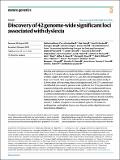Discovery of 42 genome-wide significant loci associated with dyslexia
Abstract
Reading and writing are crucial life skills but roughly one in ten children are affected by dyslexia, which can persist into adulthood. Family studies of dyslexia suggest heritability up to 70%, yet few convincing genetic markers have been found. Here we performed a genome-wide association study of 51,800 adults self-reporting a dyslexia diagnosis and 1,087,070 controls and identified 42 independent genome-wide significant loci: 15 in genes linked to cognitive ability/educational attainment, and 27 new and potentially more specific to dyslexia. We validated 23 loci (13 new) in independent cohorts of Chinese and European ancestry. Genetic etiology of dyslexia was similar between sexes, and genetic covariance with many traits was found, including ambidexterity, but not neuroanatomical measures of language-related circuitry. Dyslexia polygenic scores explained up to 6% of variance in reading traits, and might in future contribute to earlier identification and remediation of dyslexia.
Citation
Doust , C , Fontanillas , P , Eising , E , Gordon , S D , Wang , Z , Alagöz , G , Moltz , B , 23andMe Research Team , Quantitative Trait Working Group of the GenLang Consortium , St Pourcain , B , Francks , C , Marioni , R E , Zhao , J , Paracchini , S , Talcott , J B , Monaco , A P , Stein , J F , Gruen , J R , Olson , R K , Willcutt , E G , DeFries , J C , Pennington , B F , Smith , S D , Wright , M J , Martin , N G , Auton , A , Bates , T C , Fisher , S E & Luciano , M 2022 , ' Discovery of 42 genome-wide significant loci associated with dyslexia ' , Nature Genetics , vol. 54 , pp. 1621-1629 . https://doi.org/10.1038/s41588-022-01192-y
Publication
Nature Genetics
Status
Peer reviewed
ISSN
1061-4036Type
Journal article
Description
Funding: EE, GA, BM, BSP, CF and SEF are supported by the Max Planck Society (Germany). The Chinese Reading Study was supported by grants from the National Natural Science Foundation of China Youth Project (Grant No. 61807023), the Youth Fund for Humanities and Social Sciences Research of the Ministry of Education (Grant No. 19YJC190023 and 17XJC190010), and the Natural Science Basic Research Plan in Shaanxi Province of China (Grant No. 2021JQ-309). SP is funded by the Royal Society.Collections
Items in the St Andrews Research Repository are protected by copyright, with all rights reserved, unless otherwise indicated.

